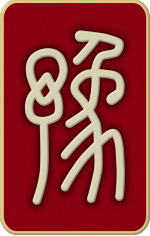
豫 Yù Delight (Enthusiasm) [hexagram 16]


Thunder over Earth
 Wood element
Wood element
Lunar month: 3 ; Host (controlling) line : 4
The Decision
Appropriate to appoint delegates and mobilize everyone.
Strength resonates with others and so the aim can be achieved with obedience – hence delight. There is dutiful progress in the way of Heaven and Earth and so even more appropriate for the people. ‘It is appropriate to appoint delegates and mobilize everyone.’ – Heaven and Earth respond submissively to the change and so Sun and Moon do not deflect from their courses. The wise conform to the change so that punishments are meted out justly, winning over the people. So indeed, ‘Delight’ has great significance.
豫: 利建侯,行师. Yù: lì jiàn hóu, xíng shī.
彖传: 象传: 豫, 刚应而志行, 顺以动, 豫. 豫, 顺以动, 故天地如之, 而况建侯行师乎?天地以顺动, 故日月不过, 而四时不忒; 圣人以顺动, 则刑罚清而民服. 豫之时义大矣哉! Tuàn zhuàn: Yù, gāng yìng ér zhì xíng, shùn yǐ dòng, yù. yù, shùn yǐ dòng, gù tiān dì rú zhī, ér kuàng jiàn hóu xíng shī hū? Tiān dì yǐ shùn dòng, gù rì yuè bù guò, ér sì shí bù tè; shèng rén yǐ shùn dòng, zé xíng fá qīng ér mín fú. Yù zhī shí yì dà yǐ zāi!
The Image
Thunder over Earth resounds in the form of ‘Delight’. In ancient times music was performed to honor virtue; it was a splendid offering to God, their great ancestor.
象传: 雷出地奋, 豫. 先王以作乐崇德, 殷荐之上帝, 以配祖考. Xiàng zhuàn: Léi chū dì fèn, yù. xiān wáng yǐ zuò lè chóng dé, yīn jiàn zhī shàng dì, yǐ pèi zǔ kǎo.
Line Change 1
Parading his satisfaction. Misfortune.
‘Parading his satisfaction. Misfortune’ – over-indulgence.
初六: 鸣豫, 凶. Chū liù: míng yù, xiōng.
象传: 初六鸣豫, 志穷凶也. Xiàng zhuàn: Chū liù míng yù, zhì qióng xiōng yě.
Line Change 2
Solid as a rock, not just waiting one day. Perseverance pays off.
‘Not just waiting one day. Perseverance pays off’ – the center place is correct.
六二: 介于石, 不终日, 贞吉. Liù èr: jiè yú shí, bù zhōng rì, zhēn jí.
(象传: 不终日, 贞吉; 以中正也. Xiàng zhuàn: Bù zhōng rì, zhēn jí; yǐ zhōng zhèng yě.
Line Change 3
Looking for further favors while already content; looking back there will be cause for regret.
‘Looking for further favors while already content; looking back there will be cause for regret’ – the position is inappropriate.
六三: 盱豫, 悔. 迟有悔. Liù sān: xū yù, huǐ. chí yǒu huǐ.
象传: 盱豫有悔, 位不当也. Xiàng zhuàn: Xū yù yǒu huǐ, wèi bù dàng yě.
Line Change 4
The source of delight is revealed. Great things can be attained. No doubts should enter your mind; friends gather around.
‘The source of delight is revealed. Great things can be attained’ – grand aims are fulfilled.
九四: 由豫, 大有得. 勿疑. 朋盍簪. Jiǔ sì: yóu yù, dà yǒu dé. wù yí. péng hé zān.
象传: 由豫, 大有得; 志大行也. Xiàng zhuàn: Yóu yù, dà yǒu dé; zhì dà xíng yě.
Line Change 5
Tolerating chronic illness and still surviving.
‘Chronic illness’ is strongly indicated. ‘Still surviving’ – while remaining centered all is not lost.
六五: 贞疾, 恒不死. Liù wǔ: zhēn jí, héng bù sǐ.
象传: 六五贞疾, 乘刚也. 恒不死, 中未亡也. Xiàng zhuàn: Liù wǔ zhēn jí, chéng gāng yě. héng bù sǐ, zhōng wèi wáng yě.
Line Change 6
Dark pleasures but not too late for a change of course. No blame.
‘Dark pleasures’ that cannot be sustained.
上六: 冥豫, 成有渝, 无咎. Shàng liù: míng yù, chéng yǒu yú, wú jiù.
象传: 冥豫在上, 何可长也. Xiàng zhuàn: Míng yù zài shàng, hé kě cháng yě.
The full set of 64 English translations is available in our new book 'Book of Changes - Deciphered' ➚.